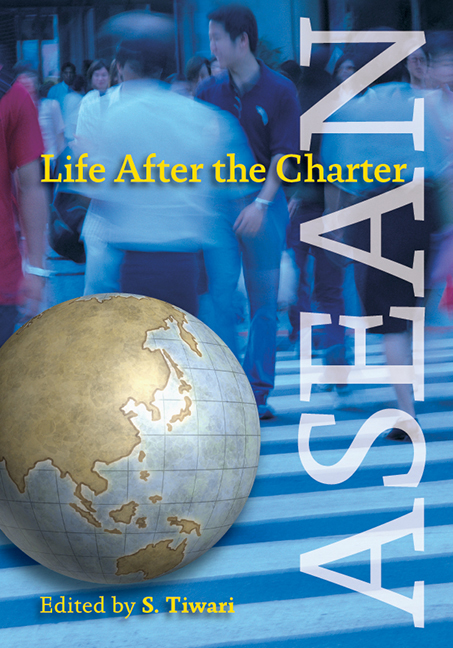Book contents
- Frontmatter
- Contents
- Foreword
- Preface
- List of Contributors
- Introduction
- 1 ASEAN Legal Personality under Its New Charter – Its Nature, Meaning and Implications: Status of the Work and Issues Involved
- 2 Does ASEAN Exist? The Association of Southeast Asian Nations as an International Legal Person
- 3 Life in ASEAN After the Entry into Force of the ASEAN Charter: Implications and Follow-ups
- 4 Translating the Design into a Bloc: The Domestic Implementation of the ASEAN Charter
- 5 ASEAN Trade in Goods Agreement (ATIGA)
- 6 The ASEAN Comprehensive Investment Agreement 2009: Its Objectives, Plans and Progress
- PRIVATE SECTOR PERSPECTIVES
- 7 The ASEAN Charter and the ASEAN Economic Community: A Watershed for Regional Economic Integration?
- 8 Implications of an Uncertain Global Economy on Integration Initiatives
- 9 Challenges to Achieving the ASEAN Economic Community
- 10 ASEAN: An Integrated Market?
- 11 A Miscellany of Trade Issues
- 12 Policy Issues for ASEAN Countries
- Index
8 - Implications of an Uncertain Global Economy on Integration Initiatives
from PRIVATE SECTOR PERSPECTIVES
Published online by Cambridge University Press: 21 October 2015
- Frontmatter
- Contents
- Foreword
- Preface
- List of Contributors
- Introduction
- 1 ASEAN Legal Personality under Its New Charter – Its Nature, Meaning and Implications: Status of the Work and Issues Involved
- 2 Does ASEAN Exist? The Association of Southeast Asian Nations as an International Legal Person
- 3 Life in ASEAN After the Entry into Force of the ASEAN Charter: Implications and Follow-ups
- 4 Translating the Design into a Bloc: The Domestic Implementation of the ASEAN Charter
- 5 ASEAN Trade in Goods Agreement (ATIGA)
- 6 The ASEAN Comprehensive Investment Agreement 2009: Its Objectives, Plans and Progress
- PRIVATE SECTOR PERSPECTIVES
- 7 The ASEAN Charter and the ASEAN Economic Community: A Watershed for Regional Economic Integration?
- 8 Implications of an Uncertain Global Economy on Integration Initiatives
- 9 Challenges to Achieving the ASEAN Economic Community
- 10 ASEAN: An Integrated Market?
- 11 A Miscellany of Trade Issues
- 12 Policy Issues for ASEAN Countries
- Index
Summary
In 2003 the Association of Southeast Asian Nations (ASEAN) agreed to establish an Economic Community (AEC) which would transform the region into a single market and production base which would make the region a more dynamic and stronger segment of the global supply chain. This plan was given further form in 2007 by the adoption of the ASEAN Economic Community Blueprint. The ASEAN Trade in Goods Agreement (ATIGA) and ASEAN Comprehensive Investment Agreement (ACIA) are intended to turn the vision of a single market into a reality.
However, these plans come at time of unprecedented uncertainty in the global economy. This chapter will address the implications of the crisis for the region's plans, how ATIGA and ACIA are different from previous agreements, and what else the region might add to its agenda to increase its competitiveness.
CRISIS CHANGING DRIVERS OF GROWTH
Analysis of a survey conducted by the Pacific Economic Cooperation Council (PECC) in May, showed that Southeast Asians believed that while the global economic outlook was dim, especially for the United States, Japan, and Southeast Asia, it was less so for emerging giants, China and India. The implication of this is that there is at least a perception that the traditional final markets for ASEAN's production — Western industrialized economies — are unlikely to be as robust a source of demand as in the past — but hopes remain for demand for these emerging giants.
IS THE GROWTH MODEL SHIFTING?
The same PECC survey indicates an expectation that the crisis will accelerate the regional economic integration process, especially among Southeast Asian respondents. Furthermore, a large majority of 76 per cent of Southeast Asian respondents agreed that “slower growth in Western industrialized countries for the foreseeable future will encourage a shift to domestic demand growth in Asian economies”. This change in global demand structure has profound implications for ASEAN's plans. The critical question is whether the AEC Blueprint and its implementing agreements such as ATIGA and ACIA are predicated on a pre-crisis understanding of the global economy.
- Type
- Chapter
- Information
- ASEANLife after the Charter, pp. 124 - 134Publisher: ISEAS–Yusof Ishak InstitutePrint publication year: 2010



